Across Pakistan, a chorus of protests, demonstrations, and press conferences echoed the collective demand for justice in the wake of a shocking and brutal attack on religious minority. On August Minority Rights Activists and Civil Society Demand Justice for Barbaric Attack on Churches and Homes of Christians in Jaranwala, Pakistan16, 2023, an unfortunate incident unfolded in Jaranwala, Pakistan, where 21 churches and hundreds of homes of Christian were attacked and set on fire by a large mob of Muslim extremists over allegations of desecration of the Quran and Prophet Muhammad.
Speaking at a demonstration in Karachi, Ilyas Samuel, spokesperson for Voice for Justice, acknowledged the government’s condemnation of the attack and its show of solidarity with the affected families. However, he stressed that mere statements are insufficient in the face of such heinous acts. Samuel implored the caretaker government and relevant authorities to take decisive action, ensuring that the perpetrators face the full force of the law. He further urged the government to promptly release humanitarian aid to support the affected families during this dire time.
The violence unfolded despite the presence of law enforcement personnel, as churches were looted, homes were ransacked, and properties were set on fire across various villages and towns. Malook Salamat, a human rights activist, emphasized that the recurring nature of such incidents is attributed to the lack of stringent action against those responsible in the past. He demanded that the government provide compensation to affected families for the reconstruction of their houses and churches without delay.
During a press conference held at the Lahore Press Club, Akmal Bhatti, Chairperson of Minority Alliance Pakistan (MAP), expressed his deep concern over the failure of the state to protect religious minorities. He pointed out that this pattern dates back to incidents like the 1997 attack on Christians in Shanti Nagar, where thousands of Muslims targeted houses and churches, leaving destruction in their wake. Bhatti stressed that Pakistan’s constitution guarantees the protection of religious minorities and their citizens, a commitment that has regrettably remained unfulfilled since the country’s inception.
Bhatti voiced a poignant perspective, stating that if the state cannot ensure the safety and rights of its citizens, including religious minorities, then it is clear that the state has failed in its responsibility. He urged the government to publicly apologize to the Christian community and rectify its shortcomings in protecting its citizens. He questioned the absence of effective state intervention during the Jaranwala attack, highlighting the importance of not capitulating to criminals and extremists.
Ashik Naz, a human rights activist present at a demonstration in Sahiwal, reminded the audience that this incident is not isolated; mobs often take the law into their own hands when blasphemy accusations arise. Naz cited numerous instances of violence against religious minorities, including the tragic case of Shama and Shahzad, who were burned alive.
The Chairperson of Voice for Justice Joseph Jansen, stressed the premeditated nature of this attack, orchestrated by extremist elements. He lamented the exploitation of blasphemy laws for personal vendettas, noting that a mere accusation can lead to tragic consequences. Religious minorities live in constant fear of death, given the potential repercussions of such accusations. He further highlighted the extremist manipulation of public sentiment, which drives mob violence based on alleged blasphemy.
Jansen urged for a thorough investigation into the Jaranwala incident and pressed for adequate compensation for the affected community. He called on the Punjab government to facilitate the restoration of vandalized churches and properties, ensuring the victims regain a semblance of normalcy.
In light of this appalling event and the ongoing plight of religious minorities, these activists collectively underscored the urgent need for justice, protection, and the restoration of communal harmony. The incident in Jaranwala serves as a stark reminder of the challenges faced by religious minorities and the imperative for the state to uphold its constitutional commitmen.

